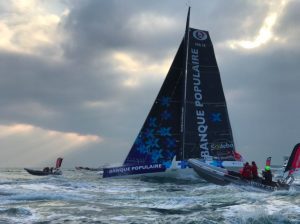On Thursday at 4:37 pm, Armel Le Cléac’h crossed the finish line of the Vendée Globe in victory. The sailor from Brittany, on board the monohull Banque Populaire VIII, finished his solo circumnavigation without stops or assistance in 74 days, 3 hours, 35 minutes and 46 seconds. On top of this fine victory, secured after coming second twice in this race in 2009 and 2013, Armel Le Cléac’h has also set a new record for the event, bringing down the time previously established by François Gabart.

“Things come in threes” is a saying that Armel Le Cléac’h obviously didn’t want to have any part in. After taking out second place on two occasions, he set out on the Vendée Globe, on 6 November 2016, with the staunch desire to finally add his name to the list of winners of this solo circumnavigation race. This wish was fulfilled on Thursday, after a little over 74 days at sea.
This much-coveted victory comes to a man who has worked flat out with his team on fine-tuning the perfect monohull for meeting this incredible challenge. The victory also marks the success of a sailor who has given his all, for two and a half months, day and night, in all imaginable climatic and sailing conditions.
A racer named Le Cléac’h
Departing from Les Sables d’Olonnes as the favorite, Armel Le Cléac’h quickly took control of the race… with Alex Thomson (Hugo Boss) on his trail. For 74 days, the two sailors engaged in a bitter battle. A consummate racer in the southern oceans, Le Cléac’h went past Cape Horn first, over 800 miles ahead of his main rival, before coming up against less favorable conditions during his climb back up the Atlantic.
For several days, less than 100 miles separated the two men, creating intense suspense around the race’s outcome. But it was finally Armel Le Cléac’h that a horde of sailors would come to welcome as the winner, the atmosphere tremendously warm despite the intense cold off the Vendée.
There was no shortage of emotion this Thursday, and the skipper of the Banque Populaire VIII did not try to hold back his tears. “I don’t really realize what’s happening to me. It’s incredible! I fought out every mile.” Before adding, in reference to Alex Thomson, whose arrival is expected tonight: “He ran a fantastic race. He’s a fearsome rival.”
Isabelle Trancoen

